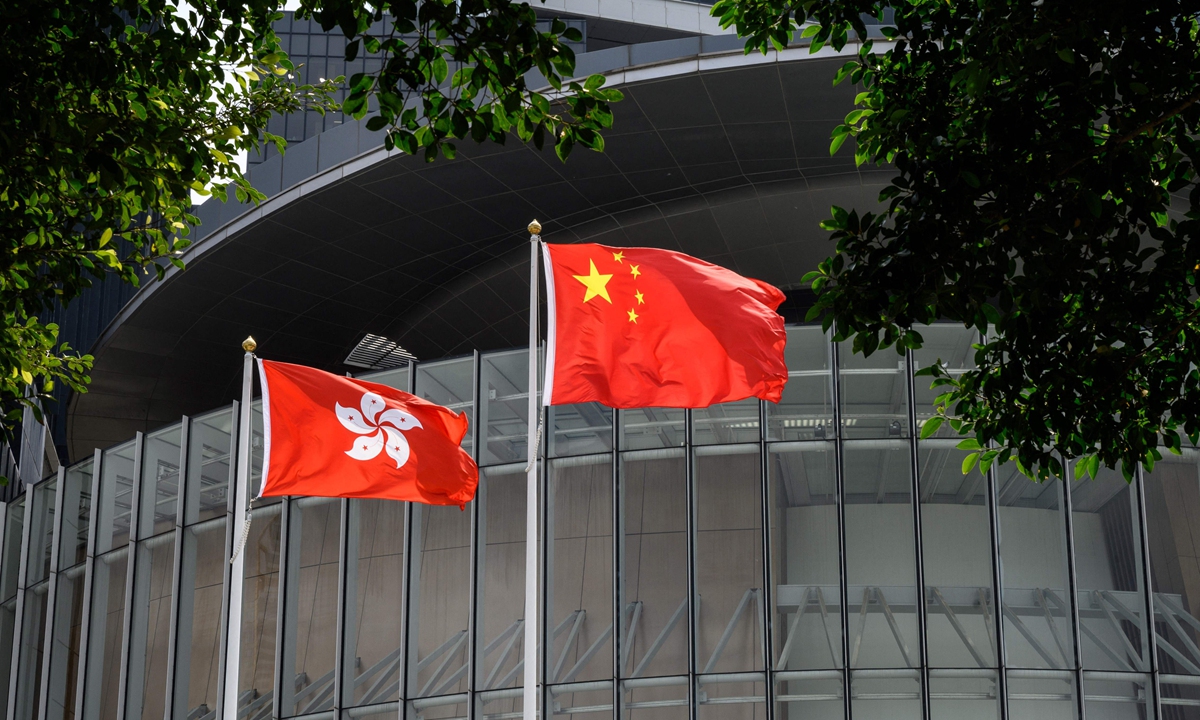
LegCo Photo:VCG
Hong Kong's Legislative Council (LegCo) spared no effort in accelerating the review procedures of the Article 23 legislation draft bill over the weekend and local officials constantly made clarification on some concerns raised by local lawmakers in Hong Kong, which also served as forceful rebuttals toward some ill-intentioned hypes made by Western media and political figures on the law.
Secretary for Security Chris Tang Ping-keung said in a post published on social media on Sunday that the legislative work for the Article 23 legislation of the Basic Law is proceeding at full speed, and he has been spending his time in the LegCo or in meeting rooms, describing himself as working so hard that he's been neglecting sleep and meals.
Tang also expressed great fortune in having an efficient team, united in their goal to "legislate [the law] as soon as possible to protect our home."
The Hong Kong Special Administrative Region (HKSAR) fast-tracked the Basic Law Article 23 legislation by
gazetting the draft bill on Friday and tabling it to the LegCo for the first and second readings on the same day. This is also the first time for the LegCo to handle the draft bill in such a quick manner, some observers said.
Over the weekend, local lawmakers raised various questions concerning the law, citing some public concerns such as whether exceptions will be specified for the crime of external interference and whether it's illegal for some residents to pass by certain military facilities and for photography enthusiasts to be paid for taking pictures of military restricted areas, which could constitute the offences in connection with espionage.
Some Western media, reporting in a biased manner, said that after the Article 23 legislation comes into effect, possessing a copy of secessionist Apple Daily could be considered illegal.
During the review process, Tang clarified that after the legislation is passed, whether someone in possession of items has an intent to incite secession depends on whether the possessor has a reasonable explanation.
"For example, 'I've placed it [seditious item] there for a long time, I didn't know it was still there, the purpose wasn't to incite, I didn't know about its existence,' that could constitute a reasonable explanation," Tang said.
In terms of the offence of external interference, Regina Ip, another lawmaker from the New People's Party, raised a question that many local think tanks in Hong Kong need to exchange and cooperate with foreign think tanks.
However, many directors or senior members of UK and US think tanks are former high-ranking officials of their local governments. Ip asked whether local think tanks' cooperation with foreign counterparts, including financial support, could violate the law.
Tang emphasized that institutions collaborating with foreign institutions, even governments, would not constitute the crime of external interference merely through cooperation or receiving funding.
While cooperation could potentially be considered as aligning with external forces, it would only violate the law if the other two elements are involved: the intention to cause an interference effect and the use of improper means, the official said.
In response to the smear launched by anti-China organization, the Committee for Freedom in Hong Kong Foundation, which blatantly requested the US to impose so-called "sanctions" on the officials of the Central Government and the HKSAR, the HKSAR government issued a statement on Sunday strongly condemning it, saying that the act of the foundation may constitute the offense of "collusion with a foreign country or with external elements to endanger national security," under the National Security Law for Hong Kong.
The definition of national security is well defined in the draft bill, and it's transparent and clear. The HKSAR Chief Executive can issue a document to identify if an alleged piece of information falls into this category, Chu Kar-kin, a veteran commentator based in the HKSAR and a member of the Chinese Association of Hong Kong and Macao Studies, told the Global Times.
"The bill persevere our law and order, security our safety. Our way of living and livelihoods are not adversely affected," Chu said.
Also, some Western opinions have been questioning the short consultation period and the rushed legislative process for the Article 23 legislation.
"In fact, following the 9/11 terrorist attacks, the US Congress passed the Patriot Act within just three days [after its introduction]," Dominic Lee Tsz-king, a local lawmaker, told the Global Times.
At that time, there was no criticism from the international community, which clearly demonstrates a double standard consistently employed by Western countries, Lee said.
In response to concerns about whether the first and second readings of draft bill were too brief, Wang Linggui, deputy director of the State Council Hong Kong and Macao Affairs, said on Sunday that the duration of the legislative process depends on its effectiveness. "As long as it meets procedural requirements, it is considered correct," Wang said.




